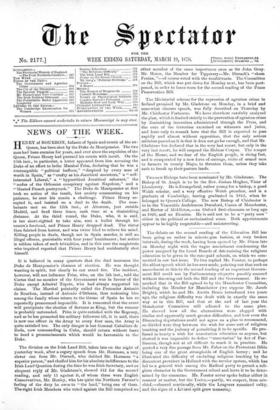The debate on the second reading of the Education Bill
has been going on rather in minute-gun fashion, at very broken intervals, during the week, having been opened by Mr. Dixon late on Monday night with the vague amendment condemning the power assigned by the Local Boards of determining the religious education to be given in the rate-paid schools, on which we com- mented in our last issue. To him replied Mr. Forster, in perhaps the ablest speech which he has ever made, pointing out that such an amendment as this to the second reading of an important Govern- ment Bill could not by Parliamentary etiquette possibly succeed without throwing out both the Bill and the Government. He re- marked that in the Bill agreed to by the Manchester Committee, including the Member for Manchester (we suppose Mr. Jacob Bright), which he and Mr. Austin Bruce introduced two years ago, the religious difficulty was dealt with in exactly the same way as in this Bill, and that at the end of last year the Manchester Committee still adhered to the same plan. He showed how all the alternatives were clogged with similar and apparently much greater difficulties, and how even the Dissenting deputations could not agree on a plan to recommend, so divided were they between the wish for some sort of religious teaching and the jealousy of permitting it to be specific. He pro- fessed as hearty a wish for unsectarian education as anyone, but showed it was impossible to define " unsectarian" by Act of Par- liament, though not at all difficult to reach it in practice. He quoted a very fine passage from Mr. Faber on the Protestant Bible being one of the great strongholds of English heresy ; and he illustrated the difficulty of excluding religious teaching by the discontent prevalent in Holland with the secular system, which has led to a general wish among the Radical party to permit a reli- gious character in the Government school and leave it to be deter- mined by the commune. Mr. Forster never spoke better either in manner or matter, but the Tories,—partly, we suspect, from mis- chief,—cheered continually, while the Leaguers remained sulky, and the signs of a Literal split grew menacing.








































 Previous page
Previous page